Critical Analysis of Legal Theories: Realism, Positivism, and More
VerifiedAdded on 2023/06/03
|10
|2412
|335
Essay
AI Summary
This essay provides a detailed analysis of several key legal theories, including Legal Realism, Legal Positivism, Marxism, and Feminist Legal Theory. It explores the differences between Legal Realism and Legal Positivism, examining their sources, criteria, sanctions, and enforcement objects. The essay also critiques Positivism and Natural Law from a Legal Realist perspective, highlighting the impact of these theories on judicial decision-making. Furthermore, it defines Marxism, discusses its relevance to legal theory, and evaluates whether it constitutes a legal theory. The essay also considers the views of Critical Legal Thinkers on the interpretation and enforcement of law. Finally, it examines Legal Feminism and its contribution to understanding the distribution of justice in society. The document is available on Desklib, a platform offering a wide range of study resources for students.

Running head: QUESTIONS 0
LEGAL THEORY
OCTOBER 20, 2018
STUDENT DETAILS:
LEGAL THEORY
OCTOBER 20, 2018
STUDENT DETAILS:
Paraphrase This Document
Need a fresh take? Get an instant paraphrase of this document with our AI Paraphraser
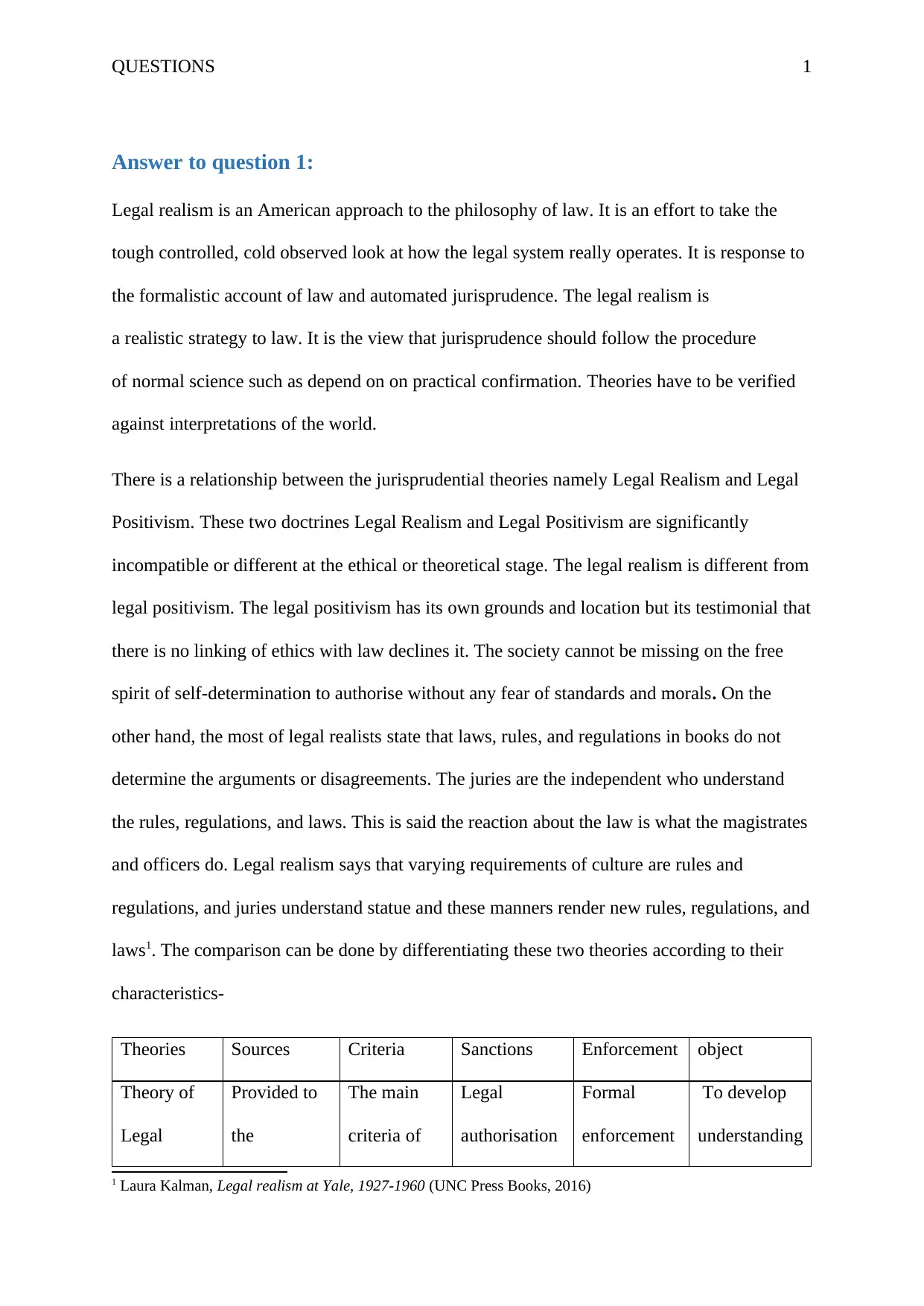
QUESTIONS 1
Answer to question 1:
Legal realism is an American approach to the philosophy of law. It is an effort to take the
tough controlled, cold observed look at how the legal system really operates. It is response to
the formalistic account of law and automated jurisprudence. The legal realism is
a realistic strategy to law. It is the view that jurisprudence should follow the procedure
of normal science such as depend on on practical confirmation. Theories have to be verified
against interpretations of the world.
There is a relationship between the jurisprudential theories namely Legal Realism and Legal
Positivism. These two doctrines Legal Realism and Legal Positivism are significantly
incompatible or different at the ethical or theoretical stage. The legal realism is different from
legal positivism. The legal positivism has its own grounds and location but its testimonial that
there is no linking of ethics with law declines it. The society cannot be missing on the free
spirit of self-determination to authorise without any fear of standards and morals. On the
other hand, the most of legal realists state that laws, rules, and regulations in books do not
determine the arguments or disagreements. The juries are the independent who understand
the rules, regulations, and laws. This is said the reaction about the law is what the magistrates
and officers do. Legal realism says that varying requirements of culture are rules and
regulations, and juries understand statue and these manners render new rules, regulations, and
laws1. The comparison can be done by differentiating these two theories according to their
characteristics-
Theories Sources Criteria Sanctions Enforcement object
Theory of
Legal
Provided to
the
The main
criteria of
Legal
authorisation
Formal
enforcement
To develop
understanding
1 Laura Kalman, Legal realism at Yale, 1927-1960 (UNC Press Books, 2016)
Answer to question 1:
Legal realism is an American approach to the philosophy of law. It is an effort to take the
tough controlled, cold observed look at how the legal system really operates. It is response to
the formalistic account of law and automated jurisprudence. The legal realism is
a realistic strategy to law. It is the view that jurisprudence should follow the procedure
of normal science such as depend on on practical confirmation. Theories have to be verified
against interpretations of the world.
There is a relationship between the jurisprudential theories namely Legal Realism and Legal
Positivism. These two doctrines Legal Realism and Legal Positivism are significantly
incompatible or different at the ethical or theoretical stage. The legal realism is different from
legal positivism. The legal positivism has its own grounds and location but its testimonial that
there is no linking of ethics with law declines it. The society cannot be missing on the free
spirit of self-determination to authorise without any fear of standards and morals. On the
other hand, the most of legal realists state that laws, rules, and regulations in books do not
determine the arguments or disagreements. The juries are the independent who understand
the rules, regulations, and laws. This is said the reaction about the law is what the magistrates
and officers do. Legal realism says that varying requirements of culture are rules and
regulations, and juries understand statue and these manners render new rules, regulations, and
laws1. The comparison can be done by differentiating these two theories according to their
characteristics-
Theories Sources Criteria Sanctions Enforcement object
Theory of
Legal
Provided to
the
The main
criteria of
Legal
authorisation
Formal
enforcement
To develop
understanding
1 Laura Kalman, Legal realism at Yale, 1927-1960 (UNC Press Books, 2016)
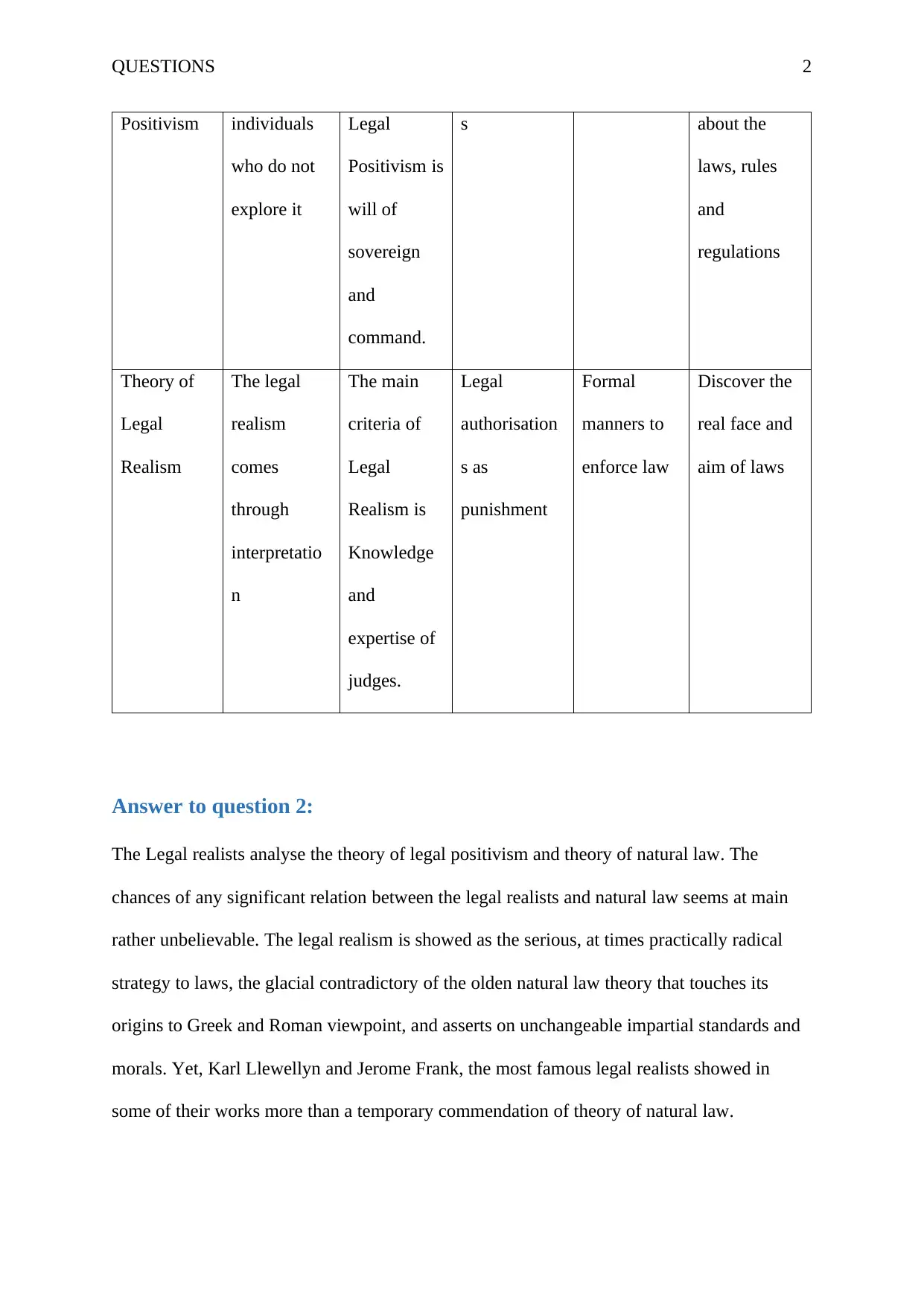
QUESTIONS 2
Positivism individuals
who do not
explore it
Legal
Positivism is
will of
sovereign
and
command.
s about the
laws, rules
and
regulations
Theory of
Legal
Realism
The legal
realism
comes
through
interpretatio
n
The main
criteria of
Legal
Realism is
Knowledge
and
expertise of
judges.
Legal
authorisation
s as
punishment
Formal
manners to
enforce law
Discover the
real face and
aim of laws
Answer to question 2:
The Legal realists analyse the theory of legal positivism and theory of natural law. The
chances of any significant relation between the legal realists and natural law seems at main
rather unbelievable. The legal realism is showed as the serious, at times practically radical
strategy to laws, the glacial contradictory of the olden natural law theory that touches its
origins to Greek and Roman viewpoint, and asserts on unchangeable impartial standards and
morals. Yet, Karl Llewellyn and Jerome Frank, the most famous legal realists showed in
some of their works more than a temporary commendation of theory of natural law.
Positivism individuals
who do not
explore it
Legal
Positivism is
will of
sovereign
and
command.
s about the
laws, rules
and
regulations
Theory of
Legal
Realism
The legal
realism
comes
through
interpretatio
n
The main
criteria of
Legal
Realism is
Knowledge
and
expertise of
judges.
Legal
authorisation
s as
punishment
Formal
manners to
enforce law
Discover the
real face and
aim of laws
Answer to question 2:
The Legal realists analyse the theory of legal positivism and theory of natural law. The
chances of any significant relation between the legal realists and natural law seems at main
rather unbelievable. The legal realism is showed as the serious, at times practically radical
strategy to laws, the glacial contradictory of the olden natural law theory that touches its
origins to Greek and Roman viewpoint, and asserts on unchangeable impartial standards and
morals. Yet, Karl Llewellyn and Jerome Frank, the most famous legal realists showed in
some of their works more than a temporary commendation of theory of natural law.
⊘ This is a preview!⊘
Do you want full access?
Subscribe today to unlock all pages.

Trusted by 1+ million students worldwide
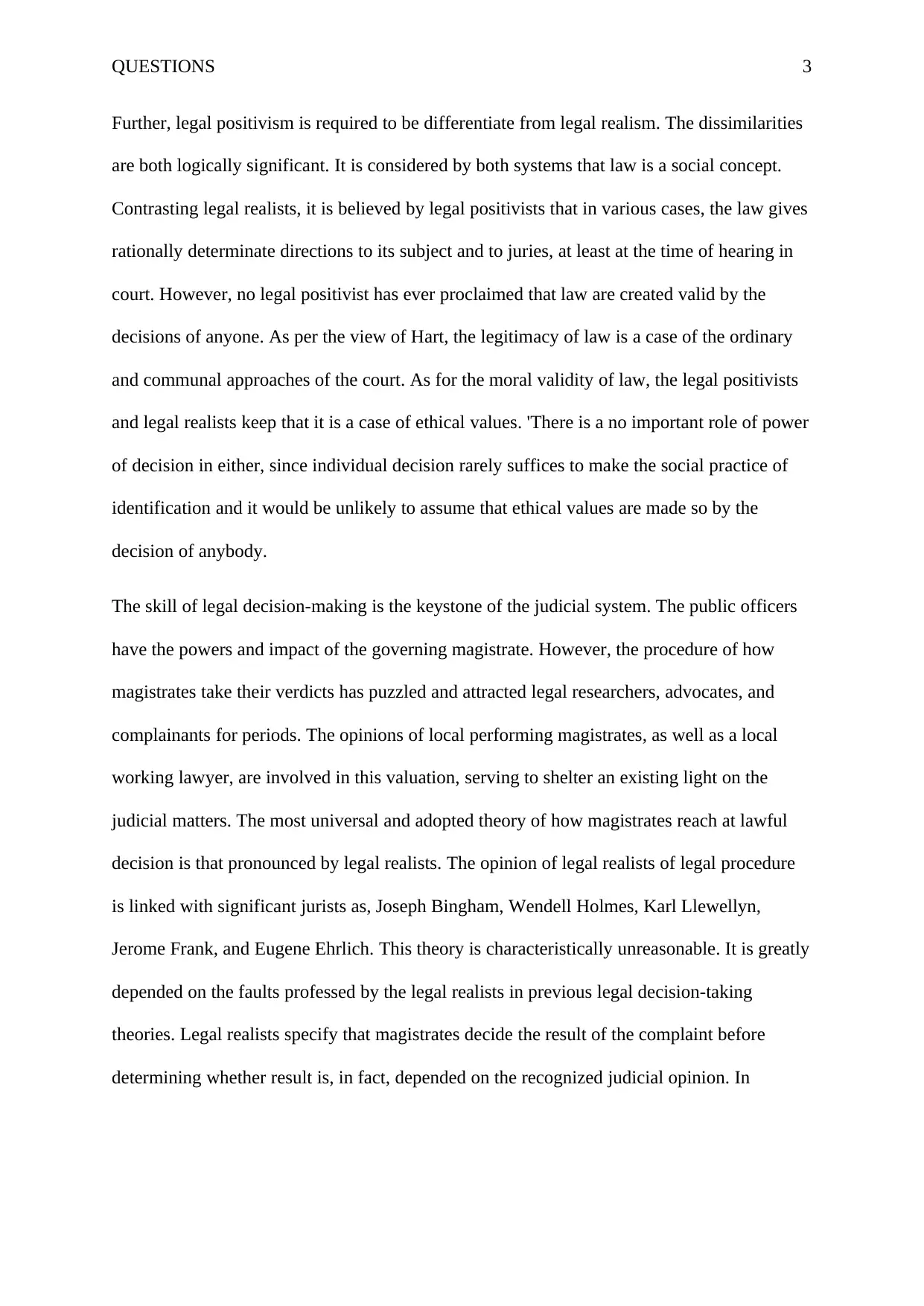
QUESTIONS 3
Further, legal positivism is required to be differentiate from legal realism. The dissimilarities
are both logically significant. It is considered by both systems that law is a social concept.
Contrasting legal realists, it is believed by legal positivists that in various cases, the law gives
rationally determinate directions to its subject and to juries, at least at the time of hearing in
court. However, no legal positivist has ever proclaimed that law are created valid by the
decisions of anyone. As per the view of Hart, the legitimacy of law is a case of the ordinary
and communal approaches of the court. As for the moral validity of law, the legal positivists
and legal realists keep that it is a case of ethical values. 'There is a no important role of power
of decision in either, since individual decision rarely suffices to make the social practice of
identification and it would be unlikely to assume that ethical values are made so by the
decision of anybody.
The skill of legal decision-making is the keystone of the judicial system. The public officers
have the powers and impact of the governing magistrate. However, the procedure of how
magistrates take their verdicts has puzzled and attracted legal researchers, advocates, and
complainants for periods. The opinions of local performing magistrates, as well as a local
working lawyer, are involved in this valuation, serving to shelter an existing light on the
judicial matters. The most universal and adopted theory of how magistrates reach at lawful
decision is that pronounced by legal realists. The opinion of legal realists of legal procedure
is linked with significant jurists as, Joseph Bingham, Wendell Holmes, Karl Llewellyn,
Jerome Frank, and Eugene Ehrlich. This theory is characteristically unreasonable. It is greatly
depended on the faults professed by the legal realists in previous legal decision-taking
theories. Legal realists specify that magistrates decide the result of the complaint before
determining whether result is, in fact, depended on the recognized judicial opinion. In
Further, legal positivism is required to be differentiate from legal realism. The dissimilarities
are both logically significant. It is considered by both systems that law is a social concept.
Contrasting legal realists, it is believed by legal positivists that in various cases, the law gives
rationally determinate directions to its subject and to juries, at least at the time of hearing in
court. However, no legal positivist has ever proclaimed that law are created valid by the
decisions of anyone. As per the view of Hart, the legitimacy of law is a case of the ordinary
and communal approaches of the court. As for the moral validity of law, the legal positivists
and legal realists keep that it is a case of ethical values. 'There is a no important role of power
of decision in either, since individual decision rarely suffices to make the social practice of
identification and it would be unlikely to assume that ethical values are made so by the
decision of anybody.
The skill of legal decision-making is the keystone of the judicial system. The public officers
have the powers and impact of the governing magistrate. However, the procedure of how
magistrates take their verdicts has puzzled and attracted legal researchers, advocates, and
complainants for periods. The opinions of local performing magistrates, as well as a local
working lawyer, are involved in this valuation, serving to shelter an existing light on the
judicial matters. The most universal and adopted theory of how magistrates reach at lawful
decision is that pronounced by legal realists. The opinion of legal realists of legal procedure
is linked with significant jurists as, Joseph Bingham, Wendell Holmes, Karl Llewellyn,
Jerome Frank, and Eugene Ehrlich. This theory is characteristically unreasonable. It is greatly
depended on the faults professed by the legal realists in previous legal decision-taking
theories. Legal realists specify that magistrates decide the result of the complaint before
determining whether result is, in fact, depended on the recognized judicial opinion. In
Paraphrase This Document
Need a fresh take? Get an instant paraphrase of this document with our AI Paraphraser
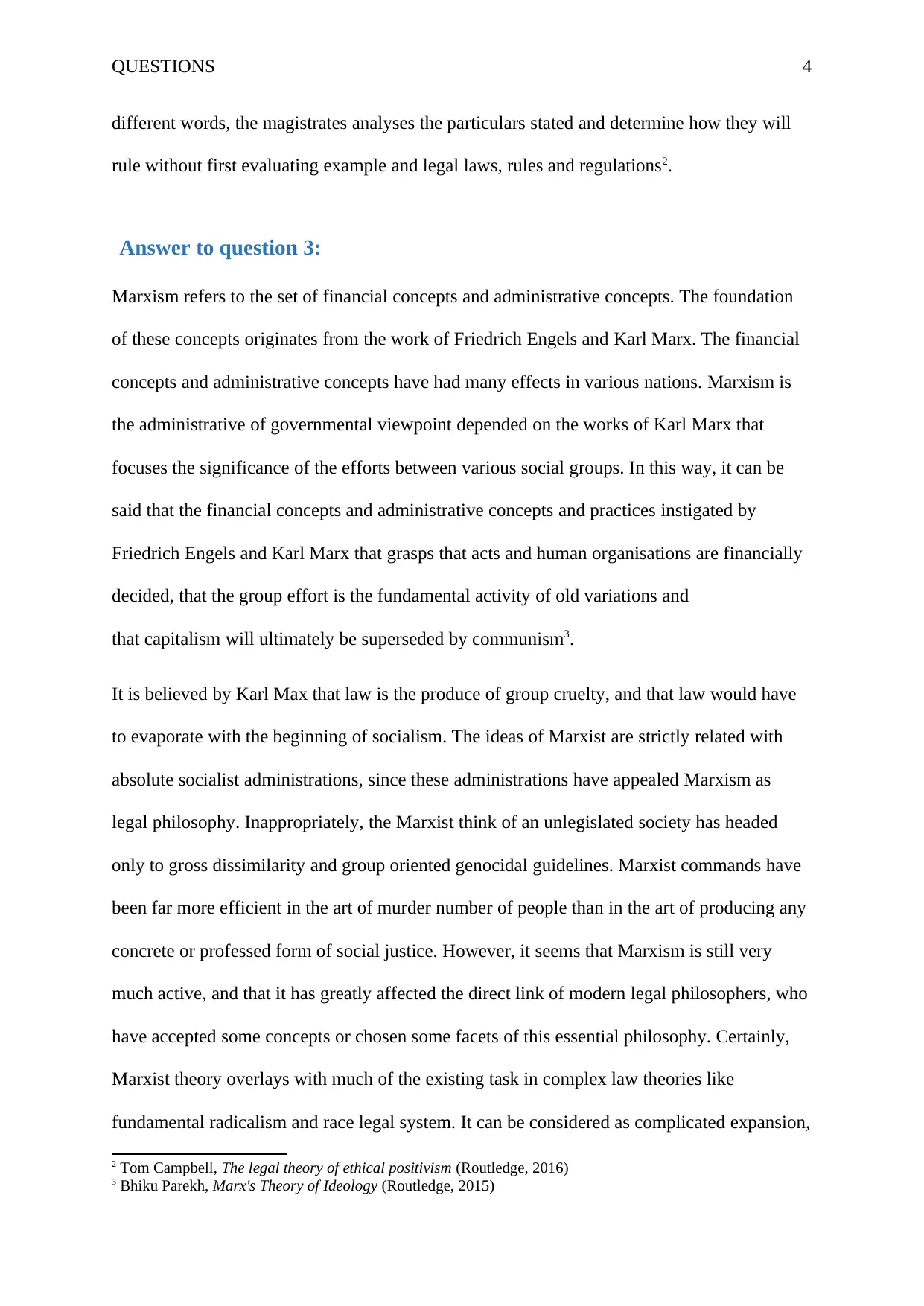
QUESTIONS 4
different words, the magistrates analyses the particulars stated and determine how they will
rule without first evaluating example and legal laws, rules and regulations2.
Answer to question 3:
Marxism refers to the set of financial concepts and administrative concepts. The foundation
of these concepts originates from the work of Friedrich Engels and Karl Marx. The financial
concepts and administrative concepts have had many effects in various nations. Marxism is
the administrative of governmental viewpoint depended on the works of Karl Marx that
focuses the significance of the efforts between various social groups. In this way, it can be
said that the financial concepts and administrative concepts and practices instigated by
Friedrich Engels and Karl Marx that grasps that acts and human organisations are financially
decided, that the group effort is the fundamental activity of old variations and
that capitalism will ultimately be superseded by communism3.
It is believed by Karl Max that law is the produce of group cruelty, and that law would have
to evaporate with the beginning of socialism. The ideas of Marxist are strictly related with
absolute socialist administrations, since these administrations have appealed Marxism as
legal philosophy. Inappropriately, the Marxist think of an unlegislated society has headed
only to gross dissimilarity and group oriented genocidal guidelines. Marxist commands have
been far more efficient in the art of murder number of people than in the art of producing any
concrete or professed form of social justice. However, it seems that Marxism is still very
much active, and that it has greatly affected the direct link of modern legal philosophers, who
have accepted some concepts or chosen some facets of this essential philosophy. Certainly,
Marxist theory overlays with much of the existing task in complex law theories like
fundamental radicalism and race legal system. It can be considered as complicated expansion,
2 Tom Campbell, The legal theory of ethical positivism (Routledge, 2016)
3 Bhiku Parekh, Marx's Theory of Ideology (Routledge, 2015)
different words, the magistrates analyses the particulars stated and determine how they will
rule without first evaluating example and legal laws, rules and regulations2.
Answer to question 3:
Marxism refers to the set of financial concepts and administrative concepts. The foundation
of these concepts originates from the work of Friedrich Engels and Karl Marx. The financial
concepts and administrative concepts have had many effects in various nations. Marxism is
the administrative of governmental viewpoint depended on the works of Karl Marx that
focuses the significance of the efforts between various social groups. In this way, it can be
said that the financial concepts and administrative concepts and practices instigated by
Friedrich Engels and Karl Marx that grasps that acts and human organisations are financially
decided, that the group effort is the fundamental activity of old variations and
that capitalism will ultimately be superseded by communism3.
It is believed by Karl Max that law is the produce of group cruelty, and that law would have
to evaporate with the beginning of socialism. The ideas of Marxist are strictly related with
absolute socialist administrations, since these administrations have appealed Marxism as
legal philosophy. Inappropriately, the Marxist think of an unlegislated society has headed
only to gross dissimilarity and group oriented genocidal guidelines. Marxist commands have
been far more efficient in the art of murder number of people than in the art of producing any
concrete or professed form of social justice. However, it seems that Marxism is still very
much active, and that it has greatly affected the direct link of modern legal philosophers, who
have accepted some concepts or chosen some facets of this essential philosophy. Certainly,
Marxist theory overlays with much of the existing task in complex law theories like
fundamental radicalism and race legal system. It can be considered as complicated expansion,
2 Tom Campbell, The legal theory of ethical positivism (Routledge, 2016)
3 Bhiku Parekh, Marx's Theory of Ideology (Routledge, 2015)
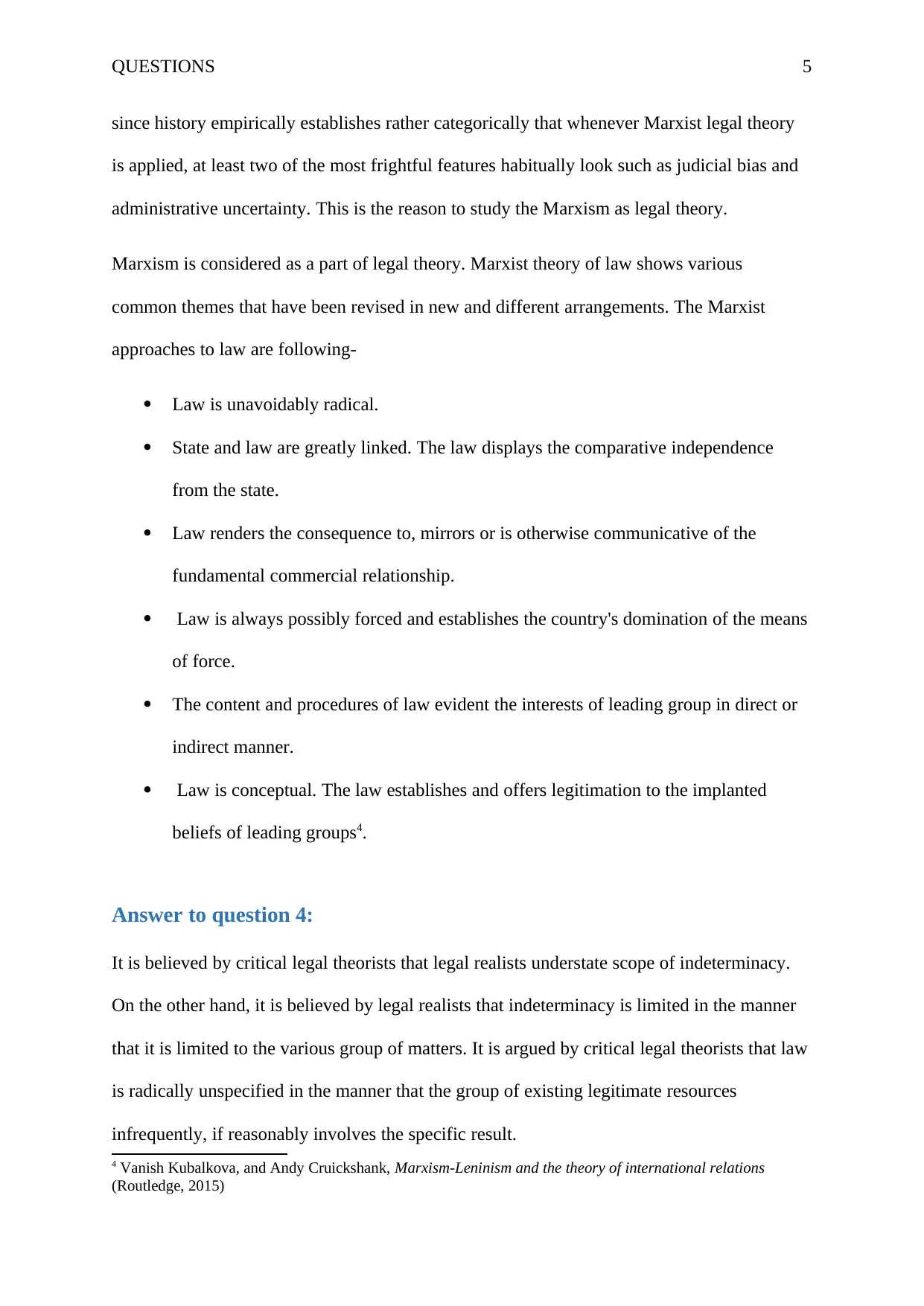
QUESTIONS 5
since history empirically establishes rather categorically that whenever Marxist legal theory
is applied, at least two of the most frightful features habitually look such as judicial bias and
administrative uncertainty. This is the reason to study the Marxism as legal theory.
Marxism is considered as a part of legal theory. Marxist theory of law shows various
common themes that have been revised in new and different arrangements. The Marxist
approaches to law are following-
Law is unavoidably radical.
State and law are greatly linked. The law displays the comparative independence
from the state.
Law renders the consequence to, mirrors or is otherwise communicative of the
fundamental commercial relationship.
Law is always possibly forced and establishes the country's domination of the means
of force.
The content and procedures of law evident the interests of leading group in direct or
indirect manner.
Law is conceptual. The law establishes and offers legitimation to the implanted
beliefs of leading groups4.
Answer to question 4:
It is believed by critical legal theorists that legal realists understate scope of indeterminacy.
On the other hand, it is believed by legal realists that indeterminacy is limited in the manner
that it is limited to the various group of matters. It is argued by critical legal theorists that law
is radically unspecified in the manner that the group of existing legitimate resources
infrequently, if reasonably involves the specific result.
4 Vanish Kubalkova, and Andy Cruickshank, Marxism-Leninism and the theory of international relations
(Routledge, 2015)
since history empirically establishes rather categorically that whenever Marxist legal theory
is applied, at least two of the most frightful features habitually look such as judicial bias and
administrative uncertainty. This is the reason to study the Marxism as legal theory.
Marxism is considered as a part of legal theory. Marxist theory of law shows various
common themes that have been revised in new and different arrangements. The Marxist
approaches to law are following-
Law is unavoidably radical.
State and law are greatly linked. The law displays the comparative independence
from the state.
Law renders the consequence to, mirrors or is otherwise communicative of the
fundamental commercial relationship.
Law is always possibly forced and establishes the country's domination of the means
of force.
The content and procedures of law evident the interests of leading group in direct or
indirect manner.
Law is conceptual. The law establishes and offers legitimation to the implanted
beliefs of leading groups4.
Answer to question 4:
It is believed by critical legal theorists that legal realists understate scope of indeterminacy.
On the other hand, it is believed by legal realists that indeterminacy is limited in the manner
that it is limited to the various group of matters. It is argued by critical legal theorists that law
is radically unspecified in the manner that the group of existing legitimate resources
infrequently, if reasonably involves the specific result.
4 Vanish Kubalkova, and Andy Cruickshank, Marxism-Leninism and the theory of international relations
(Routledge, 2015)
⊘ This is a preview!⊘
Do you want full access?
Subscribe today to unlock all pages.

Trusted by 1+ million students worldwide
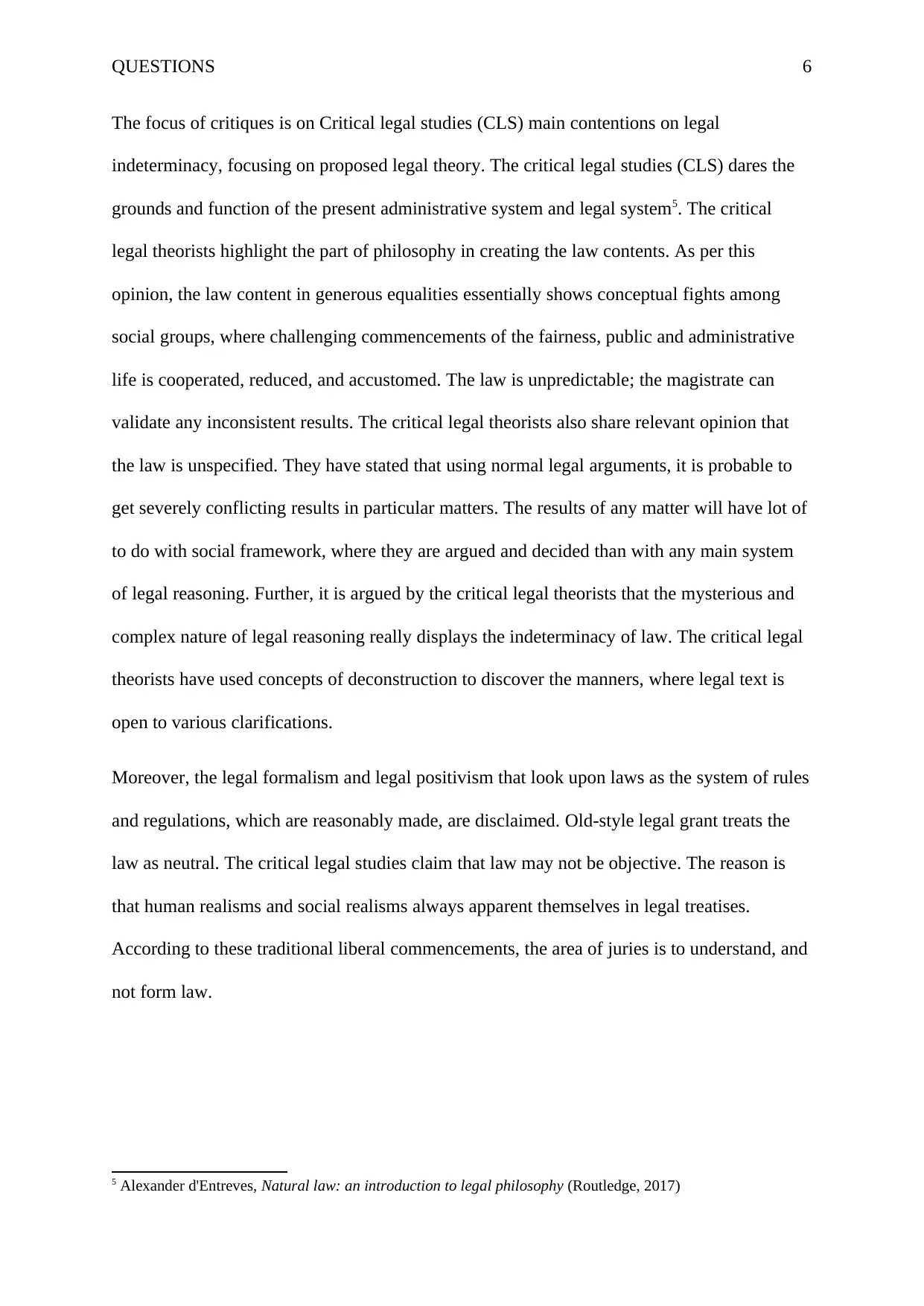
QUESTIONS 6
The focus of critiques is on Critical legal studies (CLS) main contentions on legal
indeterminacy, focusing on proposed legal theory. The critical legal studies (CLS) dares the
grounds and function of the present administrative system and legal system5. The critical
legal theorists highlight the part of philosophy in creating the law contents. As per this
opinion, the law content in generous equalities essentially shows conceptual fights among
social groups, where challenging commencements of the fairness, public and administrative
life is cooperated, reduced, and accustomed. The law is unpredictable; the magistrate can
validate any inconsistent results. The critical legal theorists also share relevant opinion that
the law is unspecified. They have stated that using normal legal arguments, it is probable to
get severely conflicting results in particular matters. The results of any matter will have lot of
to do with social framework, where they are argued and decided than with any main system
of legal reasoning. Further, it is argued by the critical legal theorists that the mysterious and
complex nature of legal reasoning really displays the indeterminacy of law. The critical legal
theorists have used concepts of deconstruction to discover the manners, where legal text is
open to various clarifications.
Moreover, the legal formalism and legal positivism that look upon laws as the system of rules
and regulations, which are reasonably made, are disclaimed. Old-style legal grant treats the
law as neutral. The critical legal studies claim that law may not be objective. The reason is
that human realisms and social realisms always apparent themselves in legal treatises.
According to these traditional liberal commencements, the area of juries is to understand, and
not form law.
5 Alexander d'Entreves, Natural law: an introduction to legal philosophy (Routledge, 2017)
The focus of critiques is on Critical legal studies (CLS) main contentions on legal
indeterminacy, focusing on proposed legal theory. The critical legal studies (CLS) dares the
grounds and function of the present administrative system and legal system5. The critical
legal theorists highlight the part of philosophy in creating the law contents. As per this
opinion, the law content in generous equalities essentially shows conceptual fights among
social groups, where challenging commencements of the fairness, public and administrative
life is cooperated, reduced, and accustomed. The law is unpredictable; the magistrate can
validate any inconsistent results. The critical legal theorists also share relevant opinion that
the law is unspecified. They have stated that using normal legal arguments, it is probable to
get severely conflicting results in particular matters. The results of any matter will have lot of
to do with social framework, where they are argued and decided than with any main system
of legal reasoning. Further, it is argued by the critical legal theorists that the mysterious and
complex nature of legal reasoning really displays the indeterminacy of law. The critical legal
theorists have used concepts of deconstruction to discover the manners, where legal text is
open to various clarifications.
Moreover, the legal formalism and legal positivism that look upon laws as the system of rules
and regulations, which are reasonably made, are disclaimed. Old-style legal grant treats the
law as neutral. The critical legal studies claim that law may not be objective. The reason is
that human realisms and social realisms always apparent themselves in legal treatises.
According to these traditional liberal commencements, the area of juries is to understand, and
not form law.
5 Alexander d'Entreves, Natural law: an introduction to legal philosophy (Routledge, 2017)
Paraphrase This Document
Need a fresh take? Get an instant paraphrase of this document with our AI Paraphraser
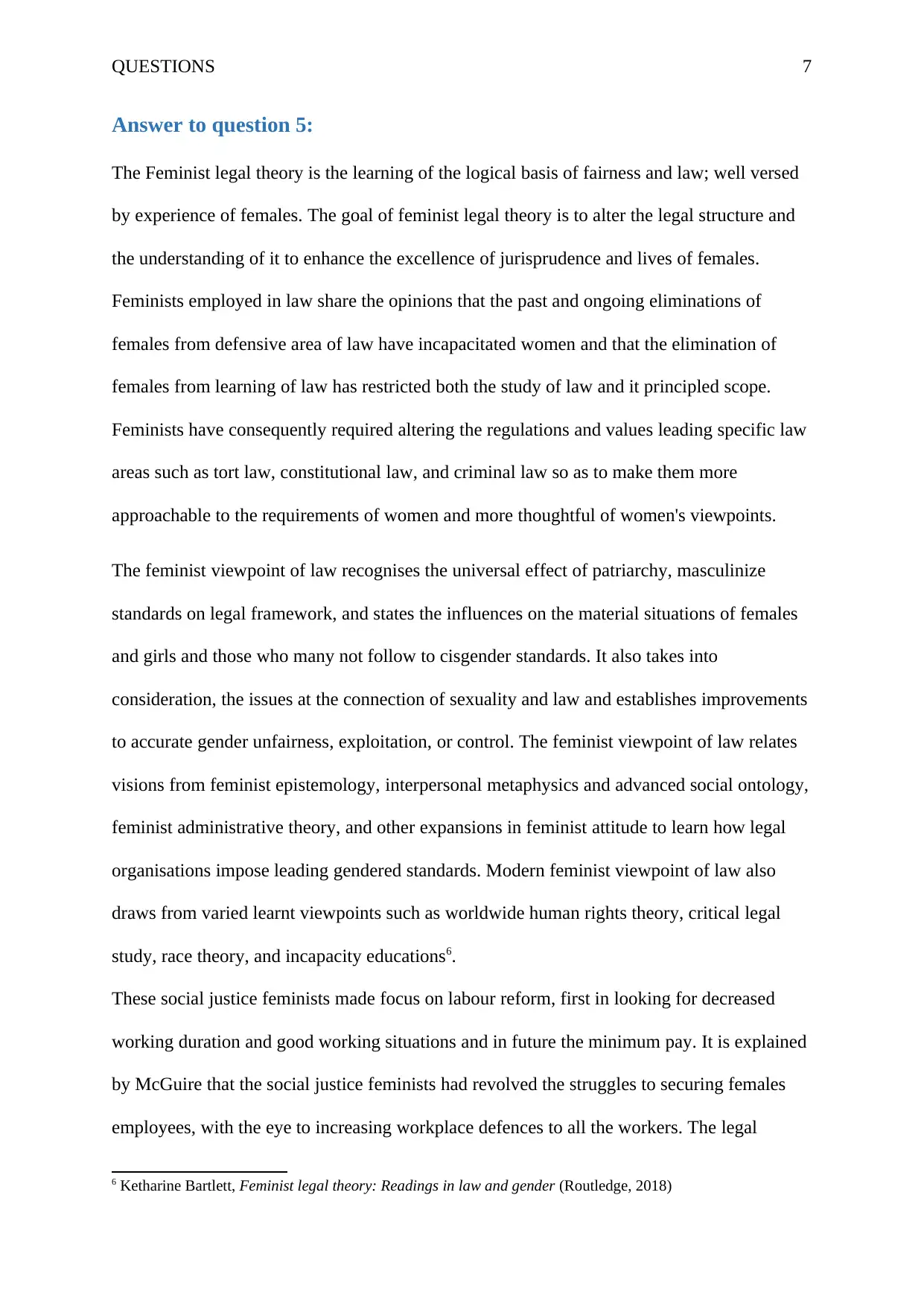
QUESTIONS 7
Answer to question 5:
The Feminist legal theory is the learning of the logical basis of fairness and law; well versed
by experience of females. The goal of feminist legal theory is to alter the legal structure and
the understanding of it to enhance the excellence of jurisprudence and lives of females.
Feminists employed in law share the opinions that the past and ongoing eliminations of
females from defensive area of law have incapacitated women and that the elimination of
females from learning of law has restricted both the study of law and it principled scope.
Feminists have consequently required altering the regulations and values leading specific law
areas such as tort law, constitutional law, and criminal law so as to make them more
approachable to the requirements of women and more thoughtful of women's viewpoints.
The feminist viewpoint of law recognises the universal effect of patriarchy, masculinize
standards on legal framework, and states the influences on the material situations of females
and girls and those who many not follow to cisgender standards. It also takes into
consideration, the issues at the connection of sexuality and law and establishes improvements
to accurate gender unfairness, exploitation, or control. The feminist viewpoint of law relates
visions from feminist epistemology, interpersonal metaphysics and advanced social ontology,
feminist administrative theory, and other expansions in feminist attitude to learn how legal
organisations impose leading gendered standards. Modern feminist viewpoint of law also
draws from varied learnt viewpoints such as worldwide human rights theory, critical legal
study, race theory, and incapacity educations6.
These social justice feminists made focus on labour reform, first in looking for decreased
working duration and good working situations and in future the minimum pay. It is explained
by McGuire that the social justice feminists had revolved the struggles to securing females
employees, with the eye to increasing workplace defences to all the workers. The legal
6 Ketharine Bartlett, Feminist legal theory: Readings in law and gender (Routledge, 2018)
Answer to question 5:
The Feminist legal theory is the learning of the logical basis of fairness and law; well versed
by experience of females. The goal of feminist legal theory is to alter the legal structure and
the understanding of it to enhance the excellence of jurisprudence and lives of females.
Feminists employed in law share the opinions that the past and ongoing eliminations of
females from defensive area of law have incapacitated women and that the elimination of
females from learning of law has restricted both the study of law and it principled scope.
Feminists have consequently required altering the regulations and values leading specific law
areas such as tort law, constitutional law, and criminal law so as to make them more
approachable to the requirements of women and more thoughtful of women's viewpoints.
The feminist viewpoint of law recognises the universal effect of patriarchy, masculinize
standards on legal framework, and states the influences on the material situations of females
and girls and those who many not follow to cisgender standards. It also takes into
consideration, the issues at the connection of sexuality and law and establishes improvements
to accurate gender unfairness, exploitation, or control. The feminist viewpoint of law relates
visions from feminist epistemology, interpersonal metaphysics and advanced social ontology,
feminist administrative theory, and other expansions in feminist attitude to learn how legal
organisations impose leading gendered standards. Modern feminist viewpoint of law also
draws from varied learnt viewpoints such as worldwide human rights theory, critical legal
study, race theory, and incapacity educations6.
These social justice feminists made focus on labour reform, first in looking for decreased
working duration and good working situations and in future the minimum pay. It is explained
by McGuire that the social justice feminists had revolved the struggles to securing females
employees, with the eye to increasing workplace defences to all the workers. The legal
6 Ketharine Bartlett, Feminist legal theory: Readings in law and gender (Routledge, 2018)
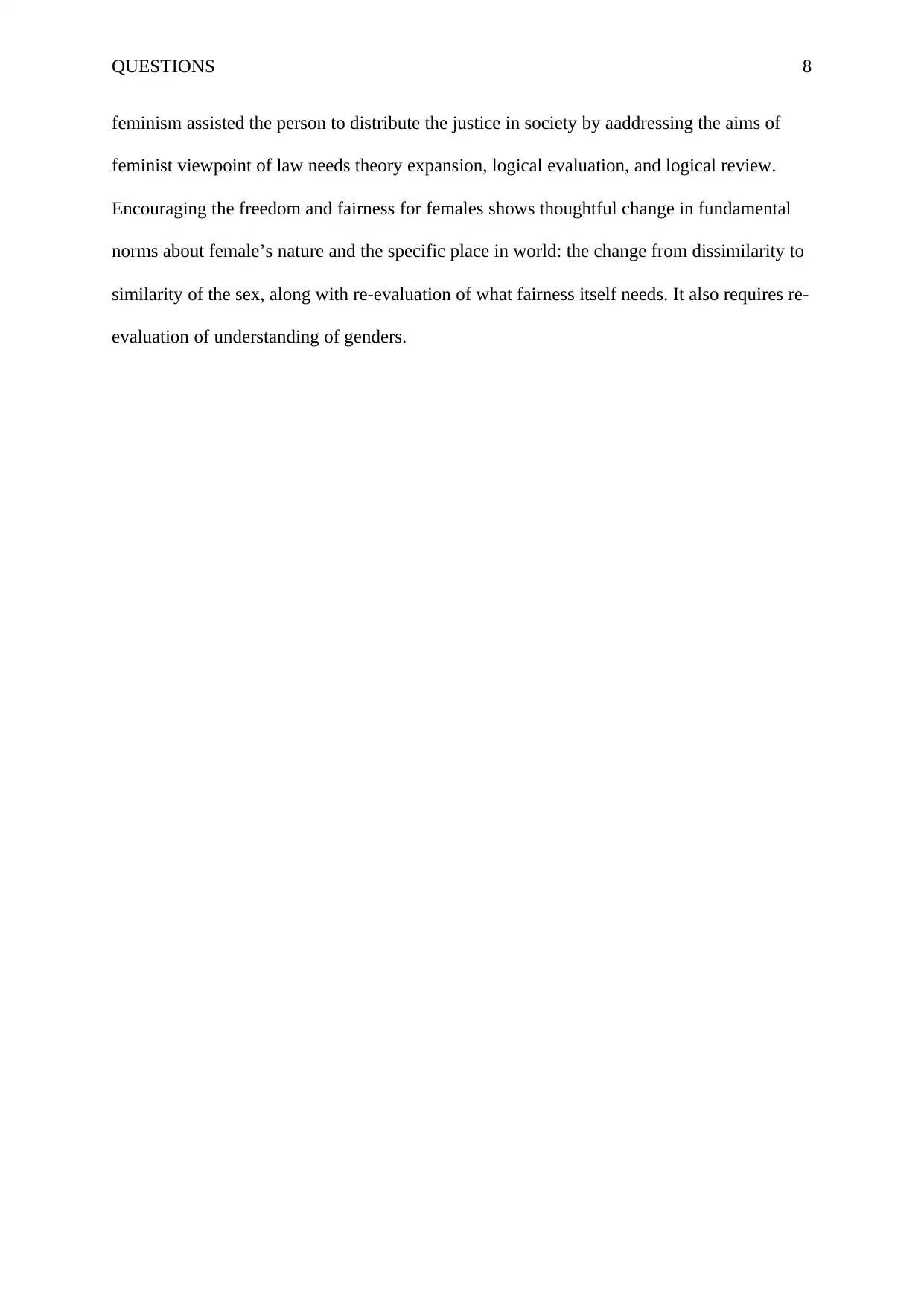
QUESTIONS 8
feminism assisted the person to distribute the justice in society by aaddressing the aims of
feminist viewpoint of law needs theory expansion, logical evaluation, and logical review.
Encouraging the freedom and fairness for females shows thoughtful change in fundamental
norms about female’s nature and the specific place in world: the change from dissimilarity to
similarity of the sex, along with re-evaluation of what fairness itself needs. It also requires re-
evaluation of understanding of genders.
feminism assisted the person to distribute the justice in society by aaddressing the aims of
feminist viewpoint of law needs theory expansion, logical evaluation, and logical review.
Encouraging the freedom and fairness for females shows thoughtful change in fundamental
norms about female’s nature and the specific place in world: the change from dissimilarity to
similarity of the sex, along with re-evaluation of what fairness itself needs. It also requires re-
evaluation of understanding of genders.
⊘ This is a preview!⊘
Do you want full access?
Subscribe today to unlock all pages.

Trusted by 1+ million students worldwide
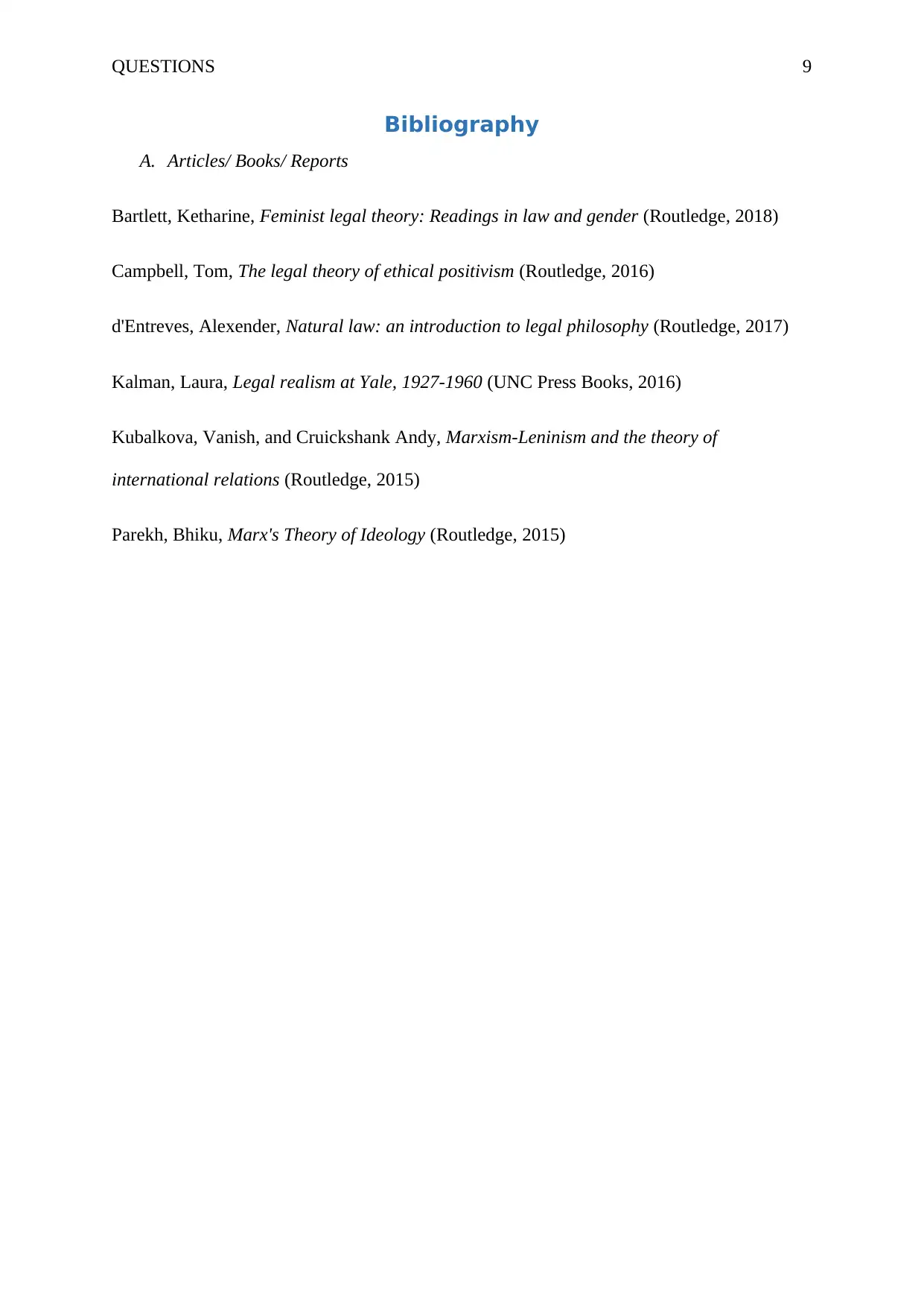
QUESTIONS 9
Bibliography
A. Articles/ Books/ Reports
Bartlett, Ketharine, Feminist legal theory: Readings in law and gender (Routledge, 2018)
Campbell, Tom, The legal theory of ethical positivism (Routledge, 2016)
d'Entreves, Alexender, Natural law: an introduction to legal philosophy (Routledge, 2017)
Kalman, Laura, Legal realism at Yale, 1927-1960 (UNC Press Books, 2016)
Kubalkova, Vanish, and Cruickshank Andy, Marxism-Leninism and the theory of
international relations (Routledge, 2015)
Parekh, Bhiku, Marx's Theory of Ideology (Routledge, 2015)
Bibliography
A. Articles/ Books/ Reports
Bartlett, Ketharine, Feminist legal theory: Readings in law and gender (Routledge, 2018)
Campbell, Tom, The legal theory of ethical positivism (Routledge, 2016)
d'Entreves, Alexender, Natural law: an introduction to legal philosophy (Routledge, 2017)
Kalman, Laura, Legal realism at Yale, 1927-1960 (UNC Press Books, 2016)
Kubalkova, Vanish, and Cruickshank Andy, Marxism-Leninism and the theory of
international relations (Routledge, 2015)
Parekh, Bhiku, Marx's Theory of Ideology (Routledge, 2015)
1 out of 10
Related Documents
Your All-in-One AI-Powered Toolkit for Academic Success.
+13062052269
info@desklib.com
Available 24*7 on WhatsApp / Email
![[object Object]](/_next/static/media/star-bottom.7253800d.svg)
Unlock your academic potential
Copyright © 2020–2026 A2Z Services. All Rights Reserved. Developed and managed by ZUCOL.





